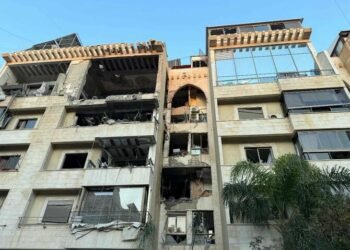DEIR AL-BALAH, Gaza Strip (news agencies) — The 12-year-old Palestinian boy was lying in a hospital bed in central Gaza, wracked with leukemia, malnourished and whimpering in pain despite the morphine doctors were giving him, when Rosalia Bollen, a UNICEF official, said she saw him in late October.
Islam al-Rayahen’s family had asked Israeli authorities six times over the past months for permission to evacuate him from Gaza for a desperately needed stem cell transplant, Bollen said. Six times, the request was refused for unexplained security reasons, she said.
Islam died three days after she saw him, Bollen said.
Thousands of patients in Gaza are waiting for Israeli permission for urgently needed medical evacuation from Gaza for treatment of war wounds or chronic diseases they can’t get after the destruction of much of the territory’s health care system by Israel’s 15-month military campaign.
Among them are at least 2,500 children who UNICEF says must be transported immediately.
“They cannot afford to wait. These children will die. They’re dying in waiting and I find it striking that the world is letting that happen,” Bollen said.
The Israeli military often takes months to respond to medical evacuation requests, and the number of evacuations has plunged in recent months. In some cases, the military rejects either the patient or, in the case of children, the caregivers accompanying them on vague security grounds or with no explanation.
The Israeli decisions appear to be “arbitrary and are not made on a criteria nor logic,” said Moeen Mahmood, the Jordan country director for Doctors Without Borders.
COGAT, the Israeli military agency in charge of humanitarian affairs for Palestinians, said in a statement to media that it “makes every effort to approve the departure of children and their families for medical treatments, subject to a security check.” It did not respond when asked for details about Islam’s case.
A military official said Israel’s internal intelligence service reviews whether the patient or their escort have what he called “a connection to terrorism,” and if one is found they are refused. The official spoke on condition of anonymity to discuss confidential procedures.
Osaid Shaheen, who is nearly 2, now faces having his eyes removed after Israel rejected his evacuation for treatment of cancer in his retinas.
The toddler was diagnosed with the cancer in April, after his mother, Sondos Abu Libda, noticed his left eyelid was droopy. The World Health Organization requested his evacuation through the Rafah border crossing in southern Gaza, but the crossing was shut down in May when Israeli troops took it over in an offensive, Abu Libda said.
WHO applied again, this time for Osaid to leave through the Kerem Shalom crossing into Israel, now the only route for evacuees to travel. During the long wait, the cancer spread to the child’s other eye and reached stage 4.
In November, Abu Libda was told Osaid was rejected on security grounds with no further explanation.
She was stunned, she said. “I didn’t expect that a child could get a security rejection.”
Doctors have given the boy three doses of chemotherapy. But with supplies short in Gaza, they’re struggling to get more. If they can’t, they will have to remove Osaid’s eyes or the cancer will spread to other parts of his body, Abu Libda said.
“He’s just a child. How will he live his life without seeing? How will he play? How will he see his future and how will his life turn out?” Abu Libda asked, standing outside the house where her family is sheltering in the Beni Suheil district of southern Gaza.
Nearby, little Osaid — who so far still has his sight — toddled around in the rubble of a building destroyed by Israeli forces, smiling as he played with chunks of rubble. When asked about his case, COGAT did not reply.
WHO says 14,000 patients of all ages need medical evacuation from Gaza, the territory’s Health Ministry puts the number higher, at 22,000, including 7,000 patients in extreme need who could die soon without treatment, according to Mohamed Abu Salmeya, a ministry official in charge of evacuation referrals.
Since the war began on Oct. 7, 2023, 5,230 patients have been evacuated, said Margaret Harris, a WHO spokesperson.









 United Arab Emirates Dirham Exchange Rate
United Arab Emirates Dirham Exchange Rate

